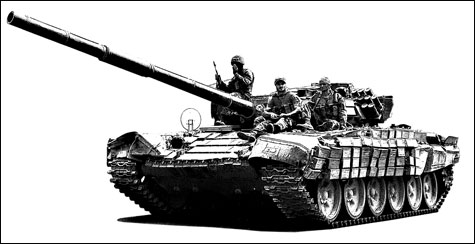
So much for the Republican Party’s long-standing boast that Ronald Reagan neutered the Soviet Union.
Russia’s brutal Soviet-style invasion of the relatively small and decidedly democratic nation of Georgia this past week may not have been enough to provoke a “better-dead-than-red” backlash here in the United States. But the Russian tanks that rumbled toward the Black Sea must have made former Soviet citizens (such as the independent people of the Ukraine) and former Soviet clients (say, in Poland and the Czech Republic) more than a bit nervous.
The Kremlin has been off its game for much of the past 20 years. Losing control of Eastern Europe and watching the Union of Soviet Socialist Republics dissolve into 15 different nations must have been a bummer.
Now, thanks to the corrupt and anti-democratic leadership of Vladimir Putin, together with a multi-billion surge in treasure from oil and natural gas, Russia is again flexing its muscles.
Putin, having squelched Chechnyan rebels in two multi-year rounds of bloody fighting, was emboldened to deal with the Georgians, who Russians traditionally consider to be obstreperous upstarts. The Kremlin likes its neighbors tame.
Georgia, with 4.6 million people (a bit more than half the population of New York City), is — or was — perhaps the most pro-American of the former Soviet Republics: witness the 2000 troops that nation committed to President Bush’s Iraq War.
The ostensible trigger for this latest invasion was the desire of provinces in western Georgia to break away and affiliate with Russia. Georgian president Mikheil Saakashvili, an admirable democrat who nevertheless is considered a loose cannon by diplomatic standards, appears not to have handled the situation well. Two weeks ago, the long-simmering conflict erupted into mortar fire along the border, prompting air strikes from the Kremlin soon thereafter, as Russian troops and armored forces entered the fray in support of the splinter region. Early Wednesday, a cease-fire was agreed upon by both sides, but the peace remains tenuous at best.
However, when a big power like Russia (or China or the United States) desires to intervene militarily in a neighboring state, almost any reason can be manufactured.
Turmoil in the Georgian provinces is only a pretext for the Russian war. The underlying reason has more to do with the misguided American policy of seeking to integrate such former Soviet Republics as Georgia and the Ukraine, and such former subject Eastern European nations as Poland, into the North Atlantic Treaty Organization (NATO) — against Russia’s protestations.
The goal of the neo-conservative foreign-policy cowboys who lease what passes for President Bush’s brain is to try to hem in Russia along its western borders. In theory, this sounds reasonable. But in practice, it is dangerous and needlessly provocative. Disregarding Russia’s geopolitical interests in the region is — much like our foray into Iraq — an example of American imperial overreach.
Make no mistake: Russia’s invasion is an international outrage. But the US and European powers now find themselves in a difficult position, unable to give full vent to their concerns: the US because it was complicit in angering Russia on the NATO issue; the European Union because it is a prisoner of Russian energy, which fuels its economy. In this case, the liberty, autonomy, and lives of Georgians are expendable when compared with the material well-being of the larger Western European nations. It is a less than noble reality.
While Western Europe’s appetite for oil and natural gas is not as profligate as that of the United States, it is still considerable. As a result, the western industrialized democracies are, to an uncomfortable extent, often constrained by wishes of the world’s two energy superpowers, Saudi Arabia and Russia.
Could a more energy self-sufficient Europe and the US have prevented the Russian invasion of Georgia? Perhaps not. But it would have allowed for at least a more vigorous response.
Take Georgia’s great and good friend President Bush. Once again, he is made to look the hollow man, promoting liberty and independence elsewhere, as is the American tradition, but refusing — or failing — to provide muscle when needed.
Republican presidential hopeful John McCain was operating within that same petulant tradition when he declared that “We are all Georgians.” Noble words, for sure. But, in the current context, they are ultimately meaningless.
As we noted this past week, the Beijing Olympics mark the symbolic formalization of modern China’s emergence as an international superpower. There is nothing symbolic about Russia’s war on Georgia. Taken together, these events are a sobering reminder that the world is a dangerous place, and that whether the US likes it or not, we will have to increasingly take into account the Russian and Chinese views of the world. The issue that is top on this agenda is Iran, and whether it will be allowed to develop nuclear weapons. Both China and Russia claim to be against Iranian nukes, but their policies in this regard are not convincing.
Closer to home for the US and Russia is a rekindling of warm relations with a post-Castro Cuba. America’s idiotic policy of continuing to isolate Cuba against all common sense makes this a potential likelihood. And with the Kremlin chafing at the idea that a newly expanded NATO will place missiles — intended to defend against possible attacks from Iran, but possibly for use against Russia, as well — on the Russian border, the idea of a future crisis with Cuba and Russia does not seem all that far-fetched.
The irony of all of this is that Reagan Republicans used to boast the US won the Cold War by bankrupting the Russians. Now, it is the US that is facing not bankruptcy but certainly severe economic challenges at home that affect our international interests. Russia will be a big part of that problem.